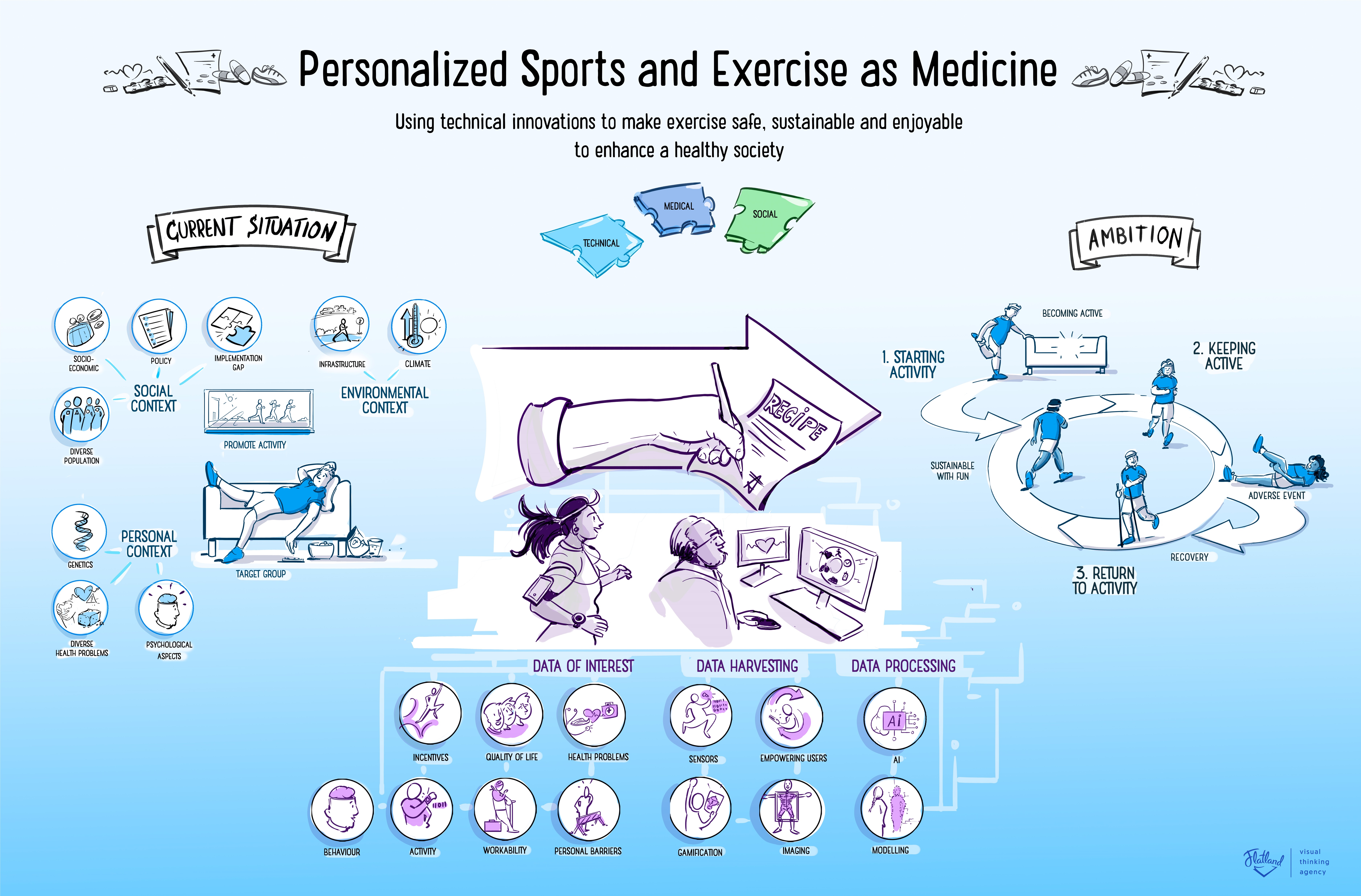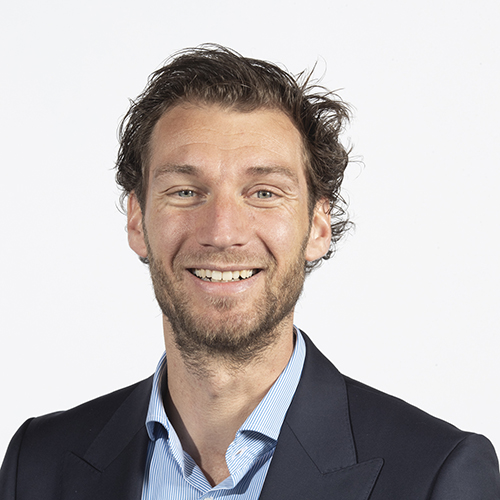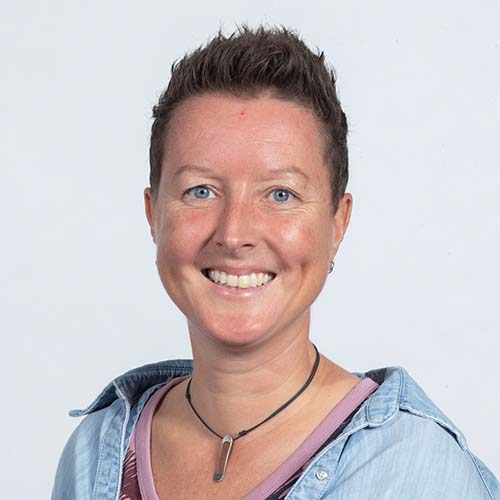What we do
About our project
Why personalized sports & exercise as medicine?
Physical activity benefits health across the lifespan, yet many who need it most are least active (underloading); others are injured by overloading. We address this balance by tailoring loading to individual capacity.
Three pillars
We integrate medicine, engineering, data science and social sciences in three pillars: Optimal loading (capacity assessment), Smart sensing (real-world monitoring), and Effective intervention (behavior-focused implementation).
Two research lines
Research spans two lines: exercise in clinical populations and sports in healthy athletes. For patients with osteoarthritis, diabetes, cardiovascular disease, cancer survivorship, or long-COVID, we quantify load capacity, personalize prescriptions, and support long-term adherence using wearables and adaptive decision support in living-lab cohorts and pragmatic trials. In athletes, we model tissue load (IMUs/GPS, imaging, strength tests) to individualize training, prevent overuse, and guide return-to-sport via personalized feedback. Outputs include decision rules, normative datasets, and risk/response models that inform safe, effective activity across care and performance settings.
Expected impact
Personalized loading reduces adverse events, increases activity, and eases healthcare burden; results feed education and rapid clinical implementation via professional networks.

Our research focus
Optimal loading
We quantify individual load-bearing capacity using imaging (e.g., MRI/US), predictive musculoskeletal & cardiopulmonary simulations, disease knowledge and genetics to inform safe prescriptions.
Smart sensing
We develop minimally invasive wearables and smart textiles to capture daily physical and physiological load (e.g., IMUs, breathing/ECG, sweat biomarkers) for feedback and large cohort monitoring.
Effective intervention
We implement tailored programs with responsible, network-based behavior change strategies and real-time feedback, and test them in living-lab settings.
From lab to practice
A technical PhD advances models and sensors; a clinical PhD runs feasibility/intervention studies, ensures safe data handling, and drives implementation in care pathwaysFunds & Grants
The Convergence Health & Technology – Flagship (pre-proposal) facilitated consortium formation.
The Consortium will search for additional grants and funding opportunities to be able to start this project.Collaborations
Main collaborating institutions
Technical University (TU) Delft
Erasmus University Rotterdam (EUR)
Other participating institutions within Consortium
Eindhoven University of Technology (TU/e)
Amsterdam University Medical Center (Amsterdam UMC)
University of Twente
Maastricht University
Radboud University Medical Center (Radboud UMC)
Municipality of Rotterdam (City of Rotterdam)
Golazo Sports
Dutch Athletics Federation (AtletiekUnie)
NL Actief
Knowledge Centre for Sport & Physical Activity (Netherlands)
Sport Data Valley
Dutch Olympic Committee (NOC*NSF)Contact us:
Robert-Jan de Vos, associate professor and sports physician, Erasmus MC University Medical Centre. r.dvos@erasmusmc.nl
Marienke van Middelkoop, associate professor General practice, Erasmus MC University Medical Centre. m.vanmiddelkoop@erasmusmc.nl
Eline van der Kruk, assistant professor Biomechanical Engineering, TU Delft. e.vanderkruk@tudelft.nl
Inge Merkelbach, assistant Professor Behaviour Change and Societal Transitions, Erasmus University Rotterdam. merkelbach@essb.eur.nl
Carlijn Gunst, projectmanager TU Delft Sports Engineering Institute. merkelbach@essb.eur.nl
Puck van de Bovenkamp, innovation manager TU Delft Impact & Innovation Center. p.a.vandebovenkamp@tudelft.nlOur team
Principal investigators
Associate Professor R.J. de Vos
Associate Professor M. van Middelkoop
Assistant Professor E. van der Kruk
Team Leaders
C. GunstP. van den Bovenkamp
Team Members Consortium
M.S. Kleinsmann (TU Delft)A. Seth (TU Delft)
T. Huysmans (TU Delft)
F.C.T. van der Helm (TU Delft)
H.E.J. Veeger (TU Delft)
K.M.B. Jansen (TU Delft)
F. Arroyo Cardoso (TU Delft)
J.J. Kraal (TU Delft)
S. Vos (TU/e)
T. Voortman (Erasmus MC)
J. Alsma (Erasmus MC)
J. van Meurs (Erasmus MC)
T. Wiggers (AtletiekUnie)
H.T. Jorstad (Amsterdam UMC)
K. Rohde (EUR – ESE)
P. Kocken (EUR – ESSB)
B. van Hooren (Maastricht University)
A. Karahanoglu (University Twente)
A. Bozzon (TU Delft)
E.E.M. Snijders (Gemeente Rotterdam)
S. Hofdom (Golazo)
R. Wouters (NL Actief)
C. Vervoorn (Kenniscentrum Sport & Bewegen)
M. van Beusekom (Sport Data Valley)
E. Visser (independent)
K. Maase (NOC*NSF)
T. Eijsvogels (Radboud UMC)
H. Koffijberg (University Twente)
A. Sciacchitano (TU Delft)
L. Lintmeijer (Sport Data Valley)
L. Bayoumi (Kenniscentrum Sport & Bewegen)


